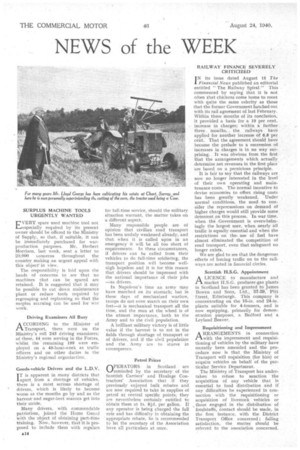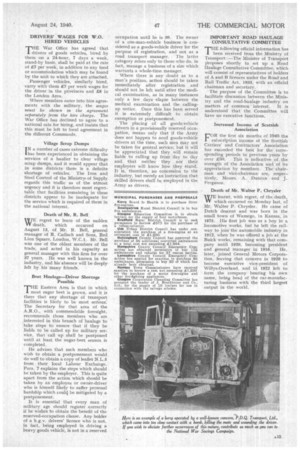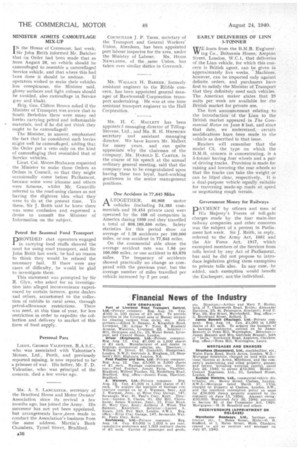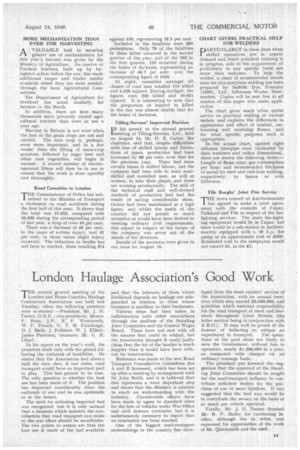NEWS of the WEEK
Page 16

Page 17

Page 18

Page 19

If you've noticed an error in this article please click here to report it so we can fix it.
SURPLUS MACHINE TOOLS URGENTLY WANTED
EVERY spare used machine tool not especially required by its present owner should be offered to the Ministry of Supply, so that, if suitable, it can be immediately purchased for warproduction purposes. Mr. Herbert Morrison, last week, sent a letter to 20,000 concerns throughout the country making an urgent appeal with this object' in view.
The responsibility is laid upon the heads of concerns to see that no machines that can be spared are retained. It is suggested that it may be possible to cut down maintenance plant or reduce tools required by regrouping and replanning so that the surplus accruing can be used for war work.
Driving Examiners All Busy
ACCORDING to the Minister of Transport, there were on the Ministry's roll 243 driving examiners: of these, 44 were serving in the Forces, whilst the remaining 199 were employed on a 48-hour-week as traffic officers and on other duties in the Ministry's regional organization,
Goods-vehicle Drivers and the L.D.V.
IT is apparent in many districts that apart. from a shortage of vehicles, there is a most serious shortage of drivers, which is likely to .become worse as the months go by and as the harvest and sugar-beet seasons get into their stride.
Many drivers, with commendable patriotism, joined the Home Guard with the object of obtaining part-time training, Now, however, that it is proposed to include them with regulars for full-time service, should the military situation warrant, the matter takes on a different aspect.
Many responsible people are of opinion that civilian road transport has been unduly weakened already, and that when it is called upon in an emergency it will be all too short of requirements: In these circumstances, if drivers can be called from their vehicles to do full-time soldiering, the transport position will become wellnigh hopeless and it is for this reason that drivers should be impressed with the national importance of their jobs —as drivers. .
In Napoleon's time an army may have marched on its stomach; but in these days of mechanized warfare, troops do not even iriarch on their own feet—it is mechanical transport all the time, and the man at the wheel is of the utmost importance, both to the Army and to the civil population.
A brilliant military victory is of little value if the harvest is to rot in the fields through shortage of transport or of drivers, and if the civil population and the Army are to starve in consequence.
Petrol Prices
OPERATORS in Scotland are '..../reminded by the secretary of the Scottish Carriers' and Haulage Contractors' Association that if they previously enjoyed bulk rebates and are now required to take in supplies of petrol at central specific points, they are nevertheless certainly entitled to obtain them at Is, 90. per gallon. If any operator is being charged the full rate and has difficulty in obtaining the appropriate rebate, he is recommended to let the secretary of the Association have all particulars at once.
RAILWAY FINANCE SEVERELY CRITICIZED
I N its issue dated August 15 The Financial News published an editorial entitled " The Railway Spiral." This commenced by saying that it is not often that chickens come home to roost with quite the same celerity as those that the former Government hatched out with its rail agreement of last February. Within three months of its conclusion, it provided a basis for a 10 per cent, increase in charges; within a further three months, the railways have applied for another increase of 6.8• per cent. That the agreement should have become the prelude to a succession of increases in charges is in no way surprising. It was obvious from the first that the arrangements which actually determine net revenues in the first place are based on a pernicious principle.
It is fair to say that the railways are now no longer interested in the level of their own operating and maintenance costs. The normal incentive to devise economies to offset rising costs has been greatly weakened. Under normal conditions, the need to consider the repercussions on demand of higher charges would still provide some deterrent an this process. In war time, when the Government is overwhelmingly the largest user, when nearly all traffic is equally essential and when the restrictions on the. use of fuel have almost eliminated the competition of road transport, even that safeguard no longer exists.
We are glad to see that the dangerous effects of forcing traffic on to the railways are noted in financial circles.
Scottish H.S.G. Appointment
ALICENCE to manufacture and market H.S.G. producer-gas plants in Scotland has been granted to James Bowen and Sons, Ltd., 57-59, Pitt Street, Edinburgh. This company is concentrating on the 10-in. and 24-in. plants suitable for 4-tonners, and is now equipping, primarily for demonstration purposes, a Bedford and a Leyland Beaver.
Requisitioning and Impressment
ARRANGEMENTS in connection with the impressment and requisitioning of vehicles by the military have recently been amended and the procedure now is that the Ministry of Transport will requisition (for hire) or acquire vehicles on behalf of the particular Service Department.
The Ministry of Transport has undertaken to refuse to sanction the acquisition of any vehicle that is essential to food distribution and if any difficulties be experienced in connection with the requisitioning or acquisition of livestock vehicle's or those engaged in the distributionof foodstuffs, contact should be made, in the first instance, with the District Transport Office concerned ; failing satisfaction, the matter should be referred to the association concerned. DRIVERS' WAGES FOR W.O. HIRED VEHICLES
THE War Office has agreed that drivers of goods vehicles, hired by them on a 24-hour, 7 days a week, stand-by basis, shall be paid at the rate of £7 per week, in addition to any food or accommodation which may be found by the unit to which they are attached.
Passenger vehicles, similarly hired, carry with them £7 per week wages for the driver in the provinces and £8 in the London Area.
Where members enter into hire agreements with the military, the wages must be shown in The agreement separately from the hire charge. The War Office has declined to agree to a national rate for hiring, and insists that this must be left to local agreement in the different Commands.
• Village Scrap Dumps
IN a number of cases extreme difficulty has been experienced in obtaining the services of a haulier to clear village scrap dumps, and it would appear that in some districts there is a definite shortage of vehicles. The Iron and Steel Control of the Ministrp of Supply regards this traffic as of the utmost urgency and it is therefore most regrettable that facilities remaining in these districts appear to be inadequate for the service which is required of them in the national interest.
Death of Mr. R. Bell
WE regret to learn of the sudden
death, which . occurred on August 13, of Mr. R. Bell, general manager of R. Ca,disch and Sons, Red Lion Square, London, W.C.I. Mr. Bell was one of the oldest members of the trade, and acted in his capacity as general manager with this firm for over 37 years. He was well known in the industry, and his absence will be deeply felt by his many friends.
Beet Haulage—Driver Shortage Possible
1-11-1E Eastern Area is that in which I most sugar beet is grown, and it is there that any shortage of transport facilities is likely to be most serious': The Secretary for that area of the A.R.O., with commendable foresight, recommends those members who are interested in this branch of haulage to take steps to ensure that if they be liable to be called up for military service, that call up shall be postponed until at least the sugar-beet season is completed.
He advises that such members who wish to obtain a postponement would do well to obtain a copy of leaflet N,L.5 from their local Labour Exchange. Para. 7 explains the steps which should be taken by the employer. This is quite apart from the action which should be taken by an employee or owner-driver who is himself likely to suffer personal hardship which coul4 be mitigated by a postponement.
It is essential that every man of military age should register .correctly if he wishes to obtain the benefit of the reserved-occupation clause. Any holder of a h.g.v. drivers' licence who is not, in fact, being employed in driving a heavy goods vehicle, is not in a reserved
occupation until he is 30. The owner of a one-man-vehicle business is considered as a goods-vehicle driver for the purpose of registration, and not as a road transport manager. The latter category refers only to those who do, in fact, manage a business of a size which warrants a whole-time manager.
Where there is any doubt as to a man's position, action should be taken immediately after registration and should not be left until after the medical examination, as in many instances only a few days elapse between the medical examination and the callingup notice. Once this has been served it is extremely difficult to obtain exemption or postponement.
The placing of all goods-vehicle drivers in a provisionally reserved occupation, means only that if the Army does not happen to need goods-vehicle drivers at the time, such men may not be taken for general service; but it will be appreciated that they, will remain liable to calling up from day to day and that neither they nor their employers will know how they stand. It is, therefore, no concession to the industry, but merely an instruction that skilled drivers shall be employed in the Army as drivers.
IMPORTANT ROAD HAULAGE CONSULTATIVE COMMITTEE
rrHE following official information has I been received from the ,Ministry of Transport :---The Minister of Transport proposes shortly to set up a Road Haulage Consultative Committee, which will consist of representatives of holders of A and B licences under the Road and Rail Traffic Act, 1933, with an official chairman and secretary.
The purpose of the Committee is to facilitate discussion between the Ministry and the road-haulage industry on matters of common ' interest. It is understood that the Committee will have no executive functions.
Increased Income of Scottish Association
FOR the first six months of 1940the subscription income of the Scottish Carriers' and Contractors' Association has exceeded the best for the corresponding periods in previous years by
over £50. This is indicative of the strength of the Association and of its appreciation by members. The chairman and vice-chairmanare, respectively, Messrs. A. Duncan and J. Ferguson.
Death of Mr. Walter P. Chrysler
WE learnt, with regret, of the death, which occurred on Monday last, of Mr. Walter P. Chrysler. He came of Dutch descent and was born in the small town of Wamego, in Kansas, in 1875. his first job was as a boy in a locomotive works, but he left the railway to join the automobile industry in 1912, when he was offered a job at the Buick works, remaining with that company until 1920, becoming president and general manager in 1916. He, later, joined General Motors Corporation, leaving that concern in 1920 to become executive vice-president of Willys-Overland, and in 1922 left to form the company bearing his own name, being head of the car-manufacturing business with the third largest output in the world.
MINISTER ADMITS CAMOUFLAGE MIX-UP IN the House of Commons, last week,
Sir John Reith inforrned Mr. Butcher that an Order had been made that as from August 26, no vehicle should be camouflaged to resemble a camouflaged Service vehicle, and that where this had
been done it should be undone. If operators wished to make their vehicles less conspicuous, the Minister said, glossy surfaces and light colours should be avoided, also camouflage in Service grey and khaki.
Brig. Gen. Clifton Brown asked if the Minister of Transport was aware that in South Berkshire there were many red lorries carryin,, petrol and inflammable materials, and he did not think they ought to be camouflaged?
The Minister, in answer, emphasized the fact that he considered such lorries .m:ght well be camouflaged, adding that the Order put a veto only on the kind of camouflaging that resembled that of Service vehicles.
Lieut. Col. Moore-Brabazon requested the Minister to make those Orders as Orders in Council, so that they might occasionally come before Parliament, because some were irksome and others were fatuous, whilst Mr. Granville referred to the road-using classes as not having the slightest idea what they were to do at the present time. To these, Sir J. Reith said he knew there was some confusion and expressed a desire to consult the Minister of Information on the subject.
Petrol for Seasonal Food Transport
pROVIDED that operators engaged in carrying food stuffs showed the need for using road transport, said Sir John Reith last week; he had no reason to think they would be refused the necessary fuel. If there were any cases of difficulty, he would be glad to investigate them.
This statement was prompted by Sir R. Glyn, who asked for an investigation into alleged inconvenience experi enced by certain farmers, game dealers and others, accustomed to the collection of rabbits in rural areas, through petrol-allowance restrictions. There was need, at this time of year, for less restriction in order to expedite the collection and delivery to market of this form of food supply.
Personal Pars LIEUT. GEORGE VALENTINE, R.A.S.C., who was associated with Valentine's Motors, Ltd., Perth, and previously reported missing, is now reported to be' a prisoner of war. His father, Mr. F. D. Valentine, who was principal of the concern, died a few weeks ago.
MR. A. S. LANCASTER, secretary of the Bradford Horse and Motor Owners' Association since its revival a few months ago, has joined the Army. His successor has not yet been appointed, but arrangements have ..been made to conduct the Association's business from the same address, Martin's Bank Chambers, Tyrrel Street, Bradford. COUNCILLOR J. P. THOM, secretary of the Transport and General lVorkers' Union, Aberdeen, has been appointed port labour inspector for the area, under the Ministry of Labour. Ma. Huron TiEWLSXDS, of the same Union, has taken over similar duties in Greenock.
MR. 'WALLACE H. BARKER, formerly assistant engineer to the Ribble concern, has been appointed general manager of Rawtenstall.Corporation transport undertaking. He was at one time assistant transport engineer to the Hull Corporation.
MR. H. C. MALLETT has been appointe.1 managing director of TillingStevens, Ltd., and MR. R. H. HEPBURN secretary and assistant managing director. We have known Mr. Mallett for many years, and can quite appreciate why the chairman of the company, MR. HAROLD E. CARTER. in the course of his speech at the annual ordinary general meeting, said that the company was to be congratulated upon having these two loyal, hard-working gentlemen in the senior management positions.
One Accident in 77,845 Miles
ALTOGETHER, 46,968 motor vehicles (including 24,385 commercials and 16,454 private cars) were operated by the 108 oil companies in America during 1939 and they travelled a total of 808,189,590 miles. Safety statistics for this period show an average of 1.28 accidents per 100,000 miles, or one accident in 77,845 miles.
On the commercial side alone the average accident rate was 1.56 per 100,000 miles, or one accident in 63,870 miles. The frequency of accidents showed practically no change as compared with the previous year, but the average number of miles travelled per vehicle increased by 2 per cent. EARLY DELIVERIES OF LINN 5-TONNE R
vuE learn from the B.M.B. EngineerVV ing Co., Britannia House, Ampton Street, London, W.C.1, that deliveries of the Linn vehicle, for which this concern is British agent, can be given in approximately five weeks. Machines, however, can be imported only against definite orders, and purchasers have first to satisfy the Minister of Transport that they definitely need such vehicles. The American maker states that 25 units per, week are available for the British market for private use.
The first announcement relating to the introduction of the Linn to the British market appeared in The Commercial Motor on June 8 last, and since that date, we understand, certain modifications have beep made to the vehicle as described in that issue.
Readers will remember that the model C5, the type on which the B.M.B. concern is concentrating, is a 5-tonner having four wheels and a pair of driving tracks. Provision is made for raising and lowering the rear -wheels so that the tracks can take the weight or can be lifted clear, respectively. It is a dual-purpose vehicle equally suitable for traversing made-up roads at speed or negotiating rough terrain.
Government Money for Railways
PAYMENT by officers and men of His Majesty's Forces of toll-gate charges made by the four main-line railway companies and other concerns was the subject of a protest in Parliament last week. Sir J. Reith, in reply. referred to the Army Act, 1881 and the Air Force Act, 1917, which exempted members of the Services from tolls levied by any Act of Parliament, but said he didnot propose to introduce legislation giving them exemption to private tolls also. In any case, he added, such exemption would benefit the Exchequer, not the individual. MORE MECHANIZATION THAN EVER FOR HARVESTING AVALUABLE lead in securing greater use of mechanization for this year's harvest was given by the Ministry of Agriculture. Its reserve 01 Fordson tractors, built up by farsighted action before the war, has made additional reaper and binder outfits available where they are most needed, through the local Agricultural Committees,
The Department of Agriculture for Scotland has acted similarly for farmers in the North, In addition, there are here many thousands more privately owned agricultural tractors than were in use a year ago.
Harvest in Britain is not over when the last of the grain crops are cut and carried. The root crop is, perhaps, even more important, and in a few weeks' time the lifting of main-crop potatoes, followed by sugar beet and other root vegetables, will begin in earnest. A record number of tractoroperated lifters will then be in use to ensure that the work is done speedily and thoroughly.
Road Casualties in London
THE Commissioner of Police has submitted to the Minister of Transport a statement on road accidents during the first half of this year. It shows that the total was 15,623, compared with 26,630 during the corresponding period of last year, a drop of over 40 per cent.
There was a decrease of 46 per cent. in the cases of serious injury, and 41 per cent. in those where slight injury occurred. The reduction in deaths has not been so marked, these totalling 374 against 459, representing 18.5 per cent.
Included in the fatalities were 260 pedestrians. Only 78 of the fatalities to these latter occurred in the second quarter of the year, and of the 182 in the first quarter, 132 occurred during the hours of darkness, representing an increase of 46.7 per cent. over the corresponding figure of 1939.
At night, casualties amongst all classes of road user totalled 174 killed and 4,328 injured. During daylight, the figures were 200 killed and 10,921 injured. It is interesting to note that the proportion of injured to killed in the day was almost double that for the hours of darkness.
Tilling.Stevens' Improved Position IN his speech at the annual general lineeting of Tilling-Stevens, Ltd., held on August 14, Mr. H. E. Carter, the chairman, said that, despite difficulties with loss of skilled labour and limitations of space, production had been increased by 88 per cent. over that for the previous year. There had been certain losses in skilled labour, but the company had been able to train semiskilled and unskilled men; as well as women, to take their places, and these are working satisfactorily. The skill of the technical staff and well-devised methods of production had had the result of saving considerable stuns. Orders had been maintained at a high figure, and 'whilst the needs of the coudtry did not permit so much attention as would have been desired to meeting ordinary civil requirements, this aspect in respect of the future of the company was never out of the minds of the directors.
Details of the accounts were given in our issue for August 10. CHART GIVING PRACTICAL HELP FOR WELDERS
PARTICULARLY in these days when skilled operatives are in urgent demand and much practical training is in progress, aids to the acquirement of proficiency in any specific trade are more than welcome. To help the welder, a chart of recommended nozzle sizes for oxy-acetylene welding has been prepared by Suffolk Iron Foundry (1920), Ltd., Sifbronze Works, Stowmarket. Copies will be sent free to all readers of this paper who make application.
The chart gives much other useful advice on practical welding of various metals, and explains the differences in appearance and effect of neutral, carbonizing and oxidizing flames, and for what specific purposes each is appropriate.
In the actual chart, against eight different blowpipe sizes (indicated by their numbers and orifice dimensions), there are shown the following items:— Length of flame cone; gas consumption per hour; and recommended thickness of metal for steel and cast-iron welding, respectively, by fusion or with Sifbronze.
Fife Burghs' Joint Fire Service
THE town council of Anchtermuchty has agreed to make a joint agreement with the councils of Cupar, Falkland and Fife in respect of the firefighting services. The main fire-fighting equipment would be in Cupar, but there would be a sub-station in Auchtermuchty equipped with a 20 hp. fire pump at an approximate cost of £500. Estimated cost to the ratepayers would not exceed 2d, in the £1.




















































